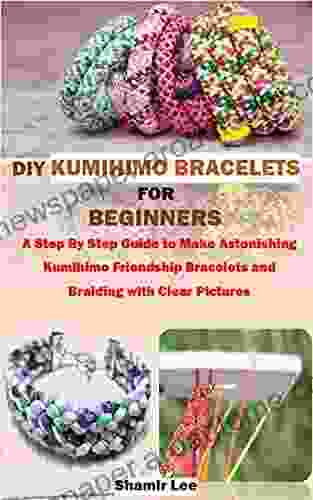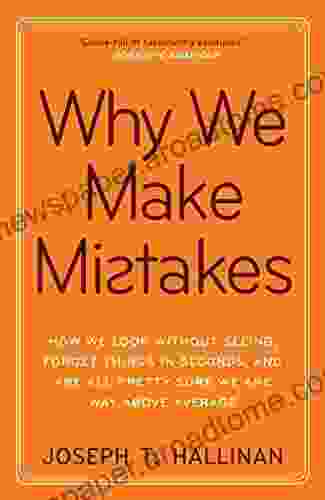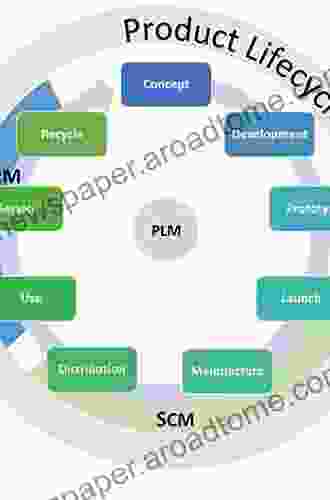How We Look Without Seeing, Forget Things In Seconds, And Are All Pretty Sure We Do

The Astonishing Capabilities of the Human Mind
The human mind is capable of extraordinary feats, many of which occur without our conscious awareness. From the way we process information without conscious effort to the way we forget memories in a matter of seconds, our minds are constantly working behind the scenes to shape our experiences and guide our behavior.
4.3 out of 5
| Language | : | English |
| File size | : | 1786 KB |
| Text-to-Speech | : | Enabled |
| Screen Reader | : | Supported |
| Enhanced typesetting | : | Enabled |
| X-Ray | : | Enabled |
| Word Wise | : | Enabled |
| Print length | : | 309 pages |
Perceiving the World Without Conscious Effort
One of the most fascinating abilities of the human mind is its ability to process information without conscious effort. This process, known as unconscious perception, allows us to take in and interpret vast amounts of information without having to actively attend to it.
For example, we are able to recognize faces and objects without having to consciously focus on them. We can also understand the meaning of words and sentences without having to decode each individual letter. This ability to process information unconsciously allows us to navigate the world around us quickly and efficiently.
Forgetting Memories in Seconds
Another surprising capability of the human mind is its ability to forget memories in a matter of seconds. This process, known as forgetting, is essential for our cognitive health. It allows us to let go of unimportant information and make room for new experiences.
There are two main types of forgetting: decay and interference. Decay is the gradual fading of a memory over time. Interference occurs when new memories interfere with the retrieval of old memories.
Forgetting is a normal part of the cognitive process. However, excessive forgetting can be a sign of a cognitive disFree Download, such as Alzheimer's disease.
The Illusion of Certainty
One of the most common human experiences is the illusion of certainty. We are all prone to believing that our own beliefs and opinions are correct, even when there is evidence to the contrary. This illusion of certainty can lead to a variety of problems, from prejudice and discrimination to conflict and violence.
There are a number of factors that contribute to the illusion of certainty. One factor is our tendency to seek out information that confirms our existing beliefs. This is known as confirmation bias.
Another factor that contributes to the illusion of certainty is our tendency to overestimate the accuracy of our own memories. This is known as the overconfidence effect.
The illusion of certainty is a powerful force in human behavior. However, it is important to remember that our beliefs and opinions are not always correct. We should always be open to new information and willing to change our minds when presented with evidence that contradicts our existing beliefs.
Overcoming the Limitations of the Human Mind
While the human mind is capable of extraordinary feats, it is also subject to a number of limitations. These limitations can include:
- Cognitive biases, such as confirmation bias and the overconfidence effect
- Limited attention span
- Limited memory capacity
- Slow reaction times
However, there are a number of things we can do to overcome these limitations and improve our cognitive performance. These include:
- Being aware of our own cognitive biases and taking steps to avoid them
- Practicing mindfulness and meditation to improve our attention span and focus
- Using memory techniques to improve our memory capacity
- Getting regular exercise to improve our overall cognitive health
The human mind is a complex and fascinating organ. It is capable of extraordinary feats, but it is also subject to a number of limitations. By understanding the capabilities and limitations of our own minds, we can take steps to improve our cognitive performance and live more fulfilling lives.
4.3 out of 5
| Language | : | English |
| File size | : | 1786 KB |
| Text-to-Speech | : | Enabled |
| Screen Reader | : | Supported |
| Enhanced typesetting | : | Enabled |
| X-Ray | : | Enabled |
| Word Wise | : | Enabled |
| Print length | : | 309 pages |
Do you want to contribute by writing guest posts on this blog?
Please contact us and send us a resume of previous articles that you have written.
 Book
Book Novel
Novel Page
Page Chapter
Chapter Text
Text Story
Story Genre
Genre Reader
Reader Library
Library Paperback
Paperback E-book
E-book Magazine
Magazine Newspaper
Newspaper Paragraph
Paragraph Sentence
Sentence Bookmark
Bookmark Shelf
Shelf Glossary
Glossary Bibliography
Bibliography Foreword
Foreword Preface
Preface Synopsis
Synopsis Annotation
Annotation Footnote
Footnote Manuscript
Manuscript Scroll
Scroll Codex
Codex Tome
Tome Bestseller
Bestseller Classics
Classics Library card
Library card Narrative
Narrative Biography
Biography Autobiography
Autobiography Memoir
Memoir Reference
Reference Encyclopedia
Encyclopedia Jonathan Rayner
Jonathan Rayner John Mcgann
John Mcgann Matthew Luke
Matthew Luke Joy Connolly
Joy Connolly Joshua Larsen
Joshua Larsen Sarah Nielsen
Sarah Nielsen Joshua Robbin Marks
Joshua Robbin Marks Jt Townsend
Jt Townsend Maurice Stewart
Maurice Stewart Julia Vickers
Julia Vickers Hank Bryant
Hank Bryant Judy Katschke
Judy Katschke Shashi Tharoor
Shashi Tharoor Joseph G Bilby
Joseph G Bilby Nic Stone
Nic Stone Julie Sczerbinski
Julie Sczerbinski S J Young
S J Young Sandra Ingerman
Sandra Ingerman Jon Katz
Jon Katz Jonathan Schell
Jonathan Schell
Light bulbAdvertise smarter! Our strategic ad space ensures maximum exposure. Reserve your spot today!
 Eli BrooksFollow ·4.6k
Eli BrooksFollow ·4.6k Yasushi InoueFollow ·11k
Yasushi InoueFollow ·11k Ignacio HayesFollow ·14.2k
Ignacio HayesFollow ·14.2k Robert BrowningFollow ·16.2k
Robert BrowningFollow ·16.2k Luke BlairFollow ·8.3k
Luke BlairFollow ·8.3k Stanley BellFollow ·2.2k
Stanley BellFollow ·2.2k Ernest ClineFollow ·17.2k
Ernest ClineFollow ·17.2k Oliver FosterFollow ·10.3k
Oliver FosterFollow ·10.3k

 Sidney Cox
Sidney CoxSpiritualism in the American Civil War
An Unseen Force in the...

 Robbie Carter
Robbie CarterEmpowering Healthcare Professionals: Discover the...
Welcome to the world of...

 Virginia Woolf
Virginia WoolfUnveil the Secrets of Nature's Healing Scents: "Growing...
Embark on an aromatic journey...

 Martin Cox
Martin CoxThe Fat Girl's Guide to Loving Your Body: Empowering...
Alt attribute: Confident plus-size woman...

 Graham Blair
Graham BlairUnlock the Secrets of Vegetables: Their Nutritional Power...
In the realm of culinary delights and...

 H.G. Wells
H.G. WellsStep-by-Step Guide to Crafting Astonishing Kumihimo...
Are you ready to embark on a captivating...
4.3 out of 5
| Language | : | English |
| File size | : | 1786 KB |
| Text-to-Speech | : | Enabled |
| Screen Reader | : | Supported |
| Enhanced typesetting | : | Enabled |
| X-Ray | : | Enabled |
| Word Wise | : | Enabled |
| Print length | : | 309 pages |












